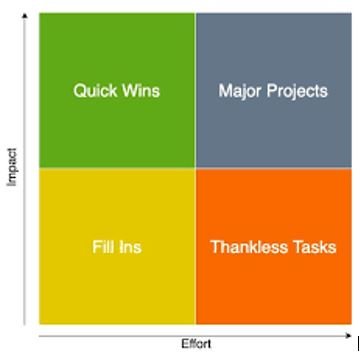What is the Action Priority Matrix?
What is the Action Priority Matrix?
Definition: The Action Priority Matrix is a model that helps people prioritise work by categorising tasks according to their potential Impact and the Effort required.
How Action Priority Matrix Works.
The Matrix works by measuring tasks against two criteria:
"Impact" which refers to the pleasurable consequences that are gained if the task is completed, or the painful consequences we must suffer if the task is ignored.
"Effort" which refers to the difficulty of the task and therefore, the time investment necessary to achieve the task.
How to Use the Action Priority Matrix.
Think of all your tasks and judge each by its Impact (which are the consequences if either done or ignored) and its Effort, (the difficulty and time needed to complete the task).
Plot each task on the Matrix according to its Impact-Effort score.

Then prioritise tasks according to the following principles:
- Work Q1 "Major projects" tasks as much as possible, since they are high value and they take a long time to complete, so you cannot afford to procrastinate on them.
- Whenever you can, do Q2 "Quick wins" tasks, since they too, are High Impact Value, and can be done quickly.
- Delegate Q3 "Thankless tasks" to people who are paid less than you are, since these tasks are of lower Impact value. If you cannot delegate the task, then do only the minimum needed to satisfy the requirements of the task.
- Consider not doing the Q4 "Fill ins" activity, or delegate them (since they are of low Impact-value). Use the time saved to crack-on with your "Major Projects" tasks.
Many people procrastinate on their "Major Projects" work because it is complex and difficult. Instead of doing the right thing they "get busy" doing lower value, easy work.
They tick-off many things on their "to do list" and then kid themselves they have had a "productive day", doing many easy, trivial tasks, whilst putting-off the more difficult, important tasks.
Remember that the "high value" QI and Q2 work should take priority over lower Impact value Q3 and Q4 work.
Time Management Training
Learn more about effective prioritisation, planning, delegation, goal setting and more, on our popular one-day Time Management Course.
Definition: Action Priority Matrix
A business tool that plots every task on a grid of impact against effort. It splits tasks into four sections: major projects, quick wins, thankless tasks and fill-ins. It tells you to act on high-impact work first, delegate or drop low-impact jobs, and so helps you spend time where it matters most.
Show CG4D Definition
- Rates each task by two factors: impact and effort
- Shows tasks on a simple two-by-two grid for instant view
- Names four sections that advise do, speed, delegate or drop
- Guides users to give most time and resources to high-impact work
Article Summary
Use the Action Priority Matrix to judge each task by impact and effort, focus on major projects and quick wins, delegate thankless chores and drop filler work, so your time delivers real results.
Frequently Asked Questions
Here are some questions that frequently get asked about this topic during our training sessions.
What do the four quadrants of the Action Priority Matrix mean?
How do I score impact and effort for each task?
Why should major projects take priority over quick wins?
When is it safe to drop a low value 'fill in' task?
Can I use the matrix for personal goals as well as work?
What common mistakes should I avoid when using the matrix?
How often should I update my Action Priority Matrix?
Thought of something that's not been answered?
Did You Know: Key Statistics
Microsoft’s 2024 Work Trend Index shows office workers now spend 57% of their week on emails, chats and meetings, leaving only 43% for project work. Asana’s 2024 State of Work report found teams that use a clear priority system, such as an impact-effort grid, record a 28% rise in work finished on time.Blogs by Email
Do you want to receive an email whenever we post a new blog? The blogs contain article 5-10 minutes long - ideal for reading during your coffee break!
Further Reading in Time Management
-
What is the Pomodoro Technique?
Learn how the Pomodoro Technique uses 25-minute work cycles and five-minute breaks to lift focus, cut mistakes and boost work efficiency all day no burnout.
Read Article > -
Managing Stress
Learn how time management and healthy habits reduce stress, control workload and build a positive mindset. Gain focus and delegate tasks with smart planning.
Read Article > -
How to Stop Procrastinating
Learn how to stop procrastinating with a quick 3-step pain-pleasure plan that builds momentum, boosts time management and turns delayed tasks into done ones.
Read Article > -
How to be More Efficient and Effective.
Learn practical time management steps to boost work efficiency: goal setting, task priority, smart sequencing, good-enough action, delegation and balanced rest.
Read Article > -
Time Management Skills: Planning Ahead
Learn how planning ahead sharpens time management, sets clear goals and guides action with seven simple questions so you achieve more and save time every day.
Read Article >
Looking for Time Management Training?
If you're looking to develop your Time Management Skills, you may find this Time Management Training Course beneficial:
Open Training Course Pricing and Availability
Next Open Course Starts in 12 days, Manchester City, places available






